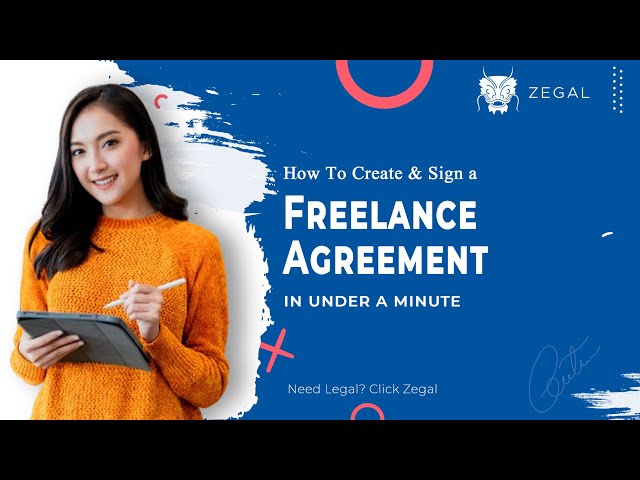How to generate a Freelance Agreement
What is a Freelance Agreement?
A Freelance Agreement is a short-form contract between a freelancer and a client to provide services. It sets out simple terms governing the services, the contract period, the service charges, the payment terms, and which party will own intellectual property rights in the works created.
A Freelance Agreement is meant for simple, straightforward transactions. For more detailed and elaborate terms, use a Consultancy Agreement.
What must be included in contracts for freelancers?
A freelance agreement must cover these areas:
Personal contact details of the involved parties:
The legal business names, addresses both contact, and billing need to be mentioned in a freelance agreement.
Type of services to be provided:
What is the scope of work and the deliverables? This is one of the main sections of a freelance agreement.
What, how and when of the service needs to be clarified well. The desirables and goals need to be clear ahead of time. For instance, if you are hiring a graphic designer, you must define what designs are expected and in which format.
Will the work be sent via mail, or will it be in print? How many changes and revisitations will the process allow? How and when will the payment be made once the task is completed?
Length of the contract period:
How long the freelancer or contractor will work with the client must be clear. Freelancers are sometimes hired for their expertise on a specific subject for a project.
Freelancers get paid commissions for their tasks as compensation but also receive a monthly retainer for the time they are working. Hence, the length of the contract needs to be well-defined.
Freelancers are sometimes asked for multiple changes, and the project does not seem to conclude. This can also be avoided by having a defined length of contract period.
Service charges and payment terms:
This details how the freelancer will be paid. The most common options are to charge for:
– Time & materials.
-A flat fee per day/week/month.
-Fixed cost or,
-Deliverable-based.
All of these payment styles have their own advantages and disadvantages. Make sure that the terms are negotiated in a freelance agreement prior to engagement.
Method of payment:
Will the payment be via bank transfer, credit card, or cheque? There are many forms of charge, and it is always wise to have different options and to have the method clarified beforehand in a freelance agreement.
Ownership of intellectual property rights in the works created:
Will the client own the IP Rights generated from this engagement? Or can the freelancer use it in future engagements? This needs to be discussed before proceeding with the tasks.
Responsibilities of the service provider:
Aside from the deliverables, a service provider typically will also deliver professional levels of punctuality, written documentation, and transparency during the term of the engagement.
Responsibilities of the client:
In certain circumstances, the contractor may need to access resources only the client can access. The freelancer should include these in the agreement if required for the service to be performed.
Notice period required to terminate this contract:
If something doesn’t work out (for example, the relationship turns sour, change in scope, etc.), terminating the contract may be necessary. Both parties should provide adequate written notice to quit.
Non-disclosure or confidentiality clauses:
Depending upon the project, the freelancer can be handed access to sensitive, classified, or confidential information. The client could require the freelancer to keep such information to themselves, so non-disclosure or NDA agreement clauses could be included in the freelance agreement. This ensures that the information is not shared externally and that the freelancer is legally bound to keep it private.
Non-compete clauses:
Certain industries, when hiring niche freelancers, could require that the freelancer not engage with competitors during or even after a certain period following the completion of the project. Having a non-compete clause is quite helpful for such times.
When should you use a Freelance Agreement?
Most companies hire freelancers for temporary and project-based work. Or they are looking for particular skills over a set period.
These independent contractors allow companies more flexibility because there is no long-term commitment, and the company is not obligated to pay for benefits such as sick pay, holiday leave, health insurance and retirement.
Using a Freelance Agreement confirms that the contractor is not a full-time employee of the company. The following types of services are but a few examples of when this agreement will come in handy:
- A software company hires a designer to design a new site.
- An agency hires a photographer to take pictures for a new campaign.
- A sales executive is placed on retainer to help with business development activities.
Common issues that freelancers face without a contract
Freelancing contracts are legally binding and specify tasks, remuneration and duration of the project. Without one, a freelancer can face several issues and problems related to:
- Delays or non-payments: With no contracts, there is no proof that the payment was to be made. This can cause clients to take payment obligations for granted or not make one.
- Undefined scope of work: Freelancers usually give in their expertise quickly to complete a project. When the project has no bounds, the tasks can be unorganized and scattered while equally time-consuming.
For those who are hiring freelancers, having a freelance contract in place can protect you in the following events:
- Dispute protection: If a freelancer claims to have been hired as an employee, the business could have a big hit, so it is essential to have a freelance agreement in place.
- Termination: If the freelancer repeatedly fails to deliver the promised tasks, you could be required to terminate the contract. However, the freelancer can argue unfair dismissal and termination if the scope and provisions have not been clarified in a freelance agreement.
Benefits of freelancing
- Decide your work: Freelancing allows you to choose assignments and jobs you are interested in and want to undertake. There is no obligation to do tasks that one does not wish to.
- Better negotiation: You can negotiate for better pay and more flexible deliverables or deadlines per your schedule.
- Be your boss: As a freelancer, you are your own boss, your own manager, and your representative. You have to report to no one and can work on your own terms.
While freelancing has its own perks, a verbal agreement or a vaguely drafted agreement can miss out on some critical details required for a formal agreement to be in place.
This can cost time and money to either of the parties. Hence, a well-drafted freelance agreement is crucial for freelancers to make the best out of their freelancing experience.
Do I have to pay for a freelancer IP agreement?
This largely depends on how the contract has been drafted. If a contract in place officially states that IP rights will be passed onto the client upon completion of the project, then the IP will be passed to the client.
However, until its completion, it still belongs to the freelancer. When you pay a freelancer for some work, your payment is for the right to use their IP, not to own it.
Are freelance Agreements short-term or long-term contracts?
Freelance agreements can be both short and long-term.
For short-term projects, you define the scope and have the details put in accordingly so you have a short-term freelance agreement.
However, if a freelancer is going to work with the same client for a longer duration where they have a regular monthly retainer and the freelancer is required to dedicate quite a lot of time for the project, you should go for long-term freelance contracts and clearly specify the details of retainer fee too.
Create a freelance agreement
Sign up to Zegal free, take a look around the app, then choose the best plan for your business.
Stay compliant with the Zegal template library
Zegal legal template are meticulously crafted with the precision of AI and the expertise of seasoned human lawyers, providing a unique blend of speed and reliability.
You can trust that Zegal agreements are legally sound and fully compliant with current regulations.
Whether you're a startup, SME, or a larger enterprise, Zegal contract management will automate and speed up your legal processes.
Using Zegal will reduce risk, save money, and improve efficiency. Let us take care of the paperwork so you can focus on running your business.
Don’t compromise on speed or compliance. Stay secure, compliant, and efficient with Zegal.





